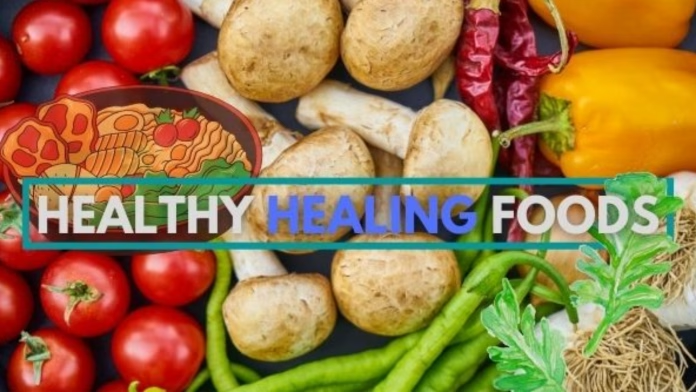Food is not just a source of nourishment; it can also possess remarkable healing powers. While we often turn to medication and traditional treatments for various ailments, there are certain foods that can provide extraordinary therapeutic benefits.
In this article, we will explore 11 surprising foods that hold the key to healing power, helping you alleviate specific health issues and improve overall well-being. Discover the potential of these natural remedies and harness their healing properties for a healthier and happier life.
- Asparagus for high blood pressure: Did you know that asparagus can aid in reducing high blood pressure? Rich in a natural diuretic called asparagine, asparagus helps the body eliminate excess fluid and salt. This makes it beneficial for individuals with edema caused by high blood pressure. Additionally, the B vitamins present in asparagus contribute to fighting cognitive decline and depression. However, individuals with gout should consume asparagus in moderation due to its purine content, which can trigger painful attacks.
- Tea for infections: Tea, a beloved beverage, contains a chemical called L-theanine that boosts the activity of immune blood cells known as gamma delta T cells. These cells act as the body’s first line of defense against infections. However, it’s important to note that drinking tea with an iron-rich meal can significantly reduce iron absorption by over 80 percent. To minimize this effect, it is recommended to consume tea between meals or add lemon to enhance iron absorption.
- Pork for energy: Pork is a rich source of thiamine, a B vitamin essential for converting carbohydrates into energy for the body and brain. Thiamine is also crucial for heart, muscle, and nervous system functions. Additionally, the zinc content in pork aids in boosting the immune system, protein synthesis, and wound healing. Incorporating pork into your diet can provide the energy and nutrients your body needs for optimal functioning.
- Onions for lung cancer: Onions, commonly used in cooking, have been linked to a reduced risk of lung cancer. A study published in the Journal of the National Cancer Institute found a significant correlation between a high intake of dietary flavonoids, found in onions, and a lower risk of developing lung cancer. Onions may also help increase levels of good cholesterol (HDL) in the body.
- Cheese for dental health: Surprisingly, cheese offers benefits for dental health. The fat present in most cheeses naturally coats the teeth, acting as a protective barrier against bacteria. Additionally, cheese contains casein, a protein that contributes to natural tooth protection. However, aged cheeses such as blue cheese and Camembert should be consumed with caution, as they can trigger migraines in susceptible individuals.
- Lemons and limes for kidney stones: The citric acid found in lemon and lime juices can help prevent certain types of kidney stones by reducing the excretion of calcium in urine. Lemon rind is also rich in rutin, a compound that strengthens veins and capillaries, potentially reducing the severity of varicose veins and associated pain. Incorporate lemons and limes into your diet to support kidney health and vascular well-being.
- Bananas for depression and anxiety: Bananas, a widely consumed fruit, offer more than just great taste. They are rich in vitamin B6, which plays a crucial role in serotonin production, a neurotransmitter that promotes feelings of calmness and happiness. Bananas also contain tryptophan, an amino acid that helps relieve symptoms of depression and anxiety. However, individuals with latex sensitivity should exercise caution, as bananas, papayas, and avocados can trigger allergic reactions.
- Mustard for good bones: Mustard, commonly used as a condiment, provides essential nutrients for maintaining strong bones and teeth. It is a source of manganese and phosphorus, both of which contribute to bone health. Mustard also contains selenium, which may protect against cancer and heart disease, and magnesium, known for its anti-inflammatory properties, as well as its ability to regulate blood pressure and blood sugar levels.
- Bran for diverticulitis: Individuals seeking to prevent diverticulitis, an intestinal disorder characterized by inflamed or infected pockets in the colon wall, can benefit from including wheat bran in their high-fiber diet. However, it’s important to note that raw bran contains phytic acid, which can inhibit the absorption of essential minerals such as calcium, iron, and zinc. Balance your bran consumption to reap its benefits while ensuring adequate mineral intake.
- Papayas for arthritis: Arthritis sufferers can find relief in papayas. These tropical fruits are rich in vitamin C, with one medium-sized papaya providing more than double the recommended daily intake. A study involving over 20,000 participants discovered that individuals with a lower intake of vitamin C-rich foods were more likely to develop rheumatoid arthritis. Incorporating papayas into your diet can support joint health and alleviate arthritis symptoms.
- Beets for a better brain: Beets, with their vibrant color and earthy flavor, offer benefits for brain health. They promote the production of nitric oxide, which enhances blood flow to the body and brain. This increased blood flow can reduce the risk of developing conditions such as Alzheimer’s and vascular dementia. However, it’s important to note that beet greens, the leafy tops, contain oxalates, which can contribute to the formation of certain kidney stones.
Nature’s bounty holds an array of remarkable healing powers, and these 11 surprising foods serve as living examples of their therapeutic potential. From asparagus for high blood pressure to beets for brain health, incorporating these foods into your diet can help alleviate specific health conditions and enhance overall well-being. Embrace the power of food as a natural remedy and unlock the remarkable healing abilities that lie within your pantry. Remember, true nourishment goes beyond satisfying hunger; it holds the key to a healthier and more vibrant life.



